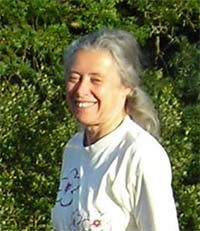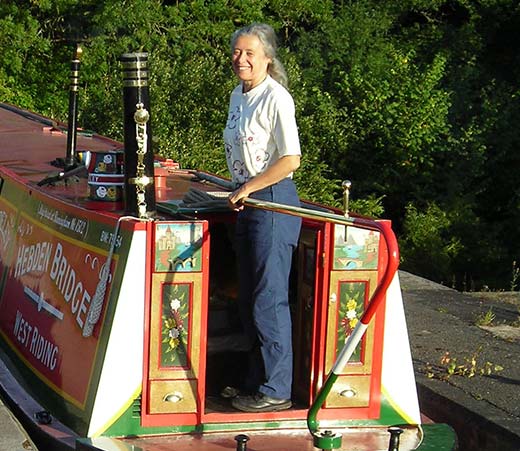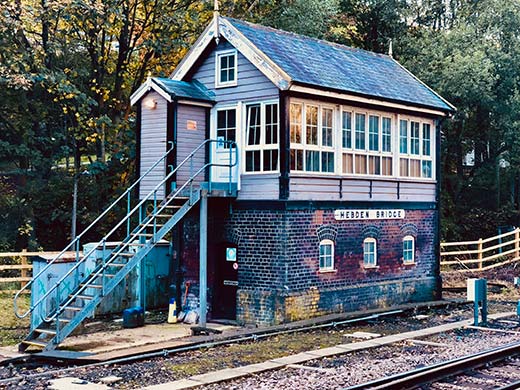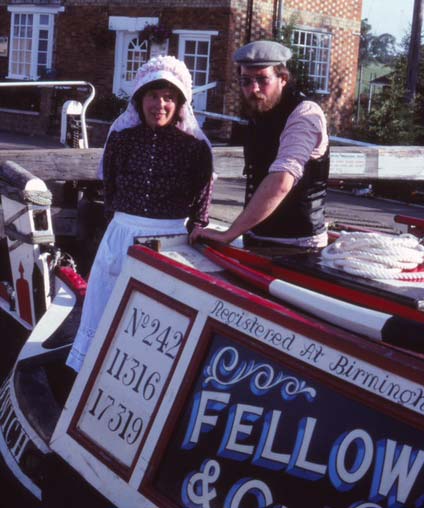
Diana Monahan
Local writer and storyteller, George Murphy interviews local characters and personalities
Introduction
 Apart from living for about eight years in the Midlands on boats, I have lived my life in various parts of Yorkshire. When we bought our small, terraced house in Hebden Bridge in 1990, I felt as if I had come home.
Apart from living for about eight years in the Midlands on boats, I have lived my life in various parts of Yorkshire. When we bought our small, terraced house in Hebden Bridge in 1990, I felt as if I had come home.
I suppose you might describe me as a polymath or a Jack/Jill of all trades because I have always been curious about many things. For 'A' levels at school, one had to choose either the science or the arts route. I opted for the former as at that point, maths was easy but a bit dull, and chemistry was my favourite subject. However, I took Music A level as an extra, mostly in my own time. I took a degree in Mathematics when I realised that there was far more to the subject than just arithmetic and geometric proofs, so I was interested to know more.
I did not intend to teach but I applied unsuccessfully for several non-teaching posts. Interview questions then included asking a female applicant if they had any imminent plans to get married and have children. My response was to ask the interviewer, "How long on average did their male graduates work for them?" The answer was something like four or five years to which I replied that I too would give them at least that.
I qualified as a maths and music teacher and my first job was at a Leeds comprehensive school where one class in each year group was able to focus on performing arts, so it was a wonderful place to combine maths teaching with my interest in music.
Leeds Education Authority was one of the first to start integration of blind and partially sighted children; it is called inclusion these days. As a teenager I had learnt the basic braille alphabet and, as an adult, I had qualified as a volunteer braillist and was producing materials for students at universities in many different subjects. I saw an advert for a mathematics post for which an interest in working with visually impaired pupils would be an advantage, so I applied for the position and was successful. I discovered later that the Head had heard of me and worded the advert in the hope that I would apply. I went on from here to take a second degree, B. Phil Ed (Special Education – visually handicapped) and worked at another "integrated unit" before starting integration in a Birmingham secondary school.
I wanted to return to Yorkshire, so obtained a post with Kirklees education authority establishing a secondary school resourced provision for visually impaired pupils. I enjoyed the immense variety and challenge involved in making the school curriculum accessible to pupils with little or no vision. By this time, computers were being used more and more in schools and while they speeded up the production of braille, teachers were producing materials with many images, so the material had to be modified and children were using ICT more.
Being able to think laterally and logically to find the best solutions to challenges was very useful. I took GCSE Spanish at an adult education class when I knew one of the blind pupils was intending to take GCSE Spanish and taught braille to a member of staff who was to support GCSE Urdu. I was training staff not only in the secondary school where I was based, but also across the authority and at a national level.
I was on various RNIB Assessment and curriculum groups which were trying to improve the consistency of external examinations prepared in braille or modified large print, tactile diagrams and the accessibility of e-learning and e-assessments.
Highlights of my career involved participating in International Conferences on Tactile Graphics, supporting a blind pupil whose A levels included mathematics and human biology, and aiding a pupil who moved on to take a degree in History at the University of Oxford.
Now I am retired, I do not know how I found time to work. I fill my hours helping people and serving my community. I like to care for the environment and can often be seen out with my litter picker.
Diana Monahan Q&A
First of all, Diana, how have you fared during the spread of the Covid pandemic and its associated lockdowns?
Lockdown stopped my volunteering with young people such as Music4Many and a school lunchtime craft club. It also stopped my visits and activities with older people in the sheltered housing.
I did more gardening, and my husband Paul and I, spent more time sitting in the garden, perhaps reading, but often just appreciating nature and being in the moment. In the evenings, we sometimes played games such as Scrabble, Cribbage, or Boggle. I like to knit, crochet, sew and do needlepoint so I had several projects on the go.
Although Paul is a good cook, I found I had more time to cook, bake, and try out new recipes. We took the opportunity to do some online learning. I started with a Future Learn course on Covid-19 so I could know the "enemy" and have some reliable sources of information, but I also enjoyed one on Flexagons and Möbius strips and several history ones about early Victorian films, 19th century railway workers and factory textile workers.
Some people might recognise you as the woman who does litter picking along the towpath. Although I think you have had a long term connection with boating and canals?
 Paul and I have always had an interest in the history of canals and historic boats and for several years we ran a business carrying cargoes on a pair of historic narrow boats. The cargoes ranged from coal or sand and gravel to beer, and even included a cruise guide writer! We believe that Paul was the first person to start, in 1988, retailing diesel from a canal boat, a trade which has become ever more popular. We still have an historic narrow boat in which we explore the 2000 miles of the waterway network. I also volunteer with the Canal and River Trust.
Paul and I have always had an interest in the history of canals and historic boats and for several years we ran a business carrying cargoes on a pair of historic narrow boats. The cargoes ranged from coal or sand and gravel to beer, and even included a cruise guide writer! We believe that Paul was the first person to start, in 1988, retailing diesel from a canal boat, a trade which has become ever more popular. We still have an historic narrow boat in which we explore the 2000 miles of the waterway network. I also volunteer with the Canal and River Trust.

You are a friend of Hebden Bridge Station and signal box. Can you update us on recent developments?
Litter picking features at the station along with bulb planting and gardening. The signal box was decommissioned in 2018 and the Friends of Hebden Bridge Station approached Calder Valley Community Land Trust with our ideas to save it. Calder Valley Community Land Trust will have a long lease with Network Rail and using their expertise in overseeing the construction of the simple holiday accommodation and an exciting project is about to begin with the recently formed Hebden Bridge Signal Box Preservation Group.

Hebden Bridge Signal Box - photo: HebWeb
A few years ago you were on television chatting to Michael Portillo about the history of Hebden Bridge. Were you chosen because of your interest in local history?
The BBC contacted the secretary of Hebden Bridge Local History Society, which at the time was me. I answered their queries about the entry in Bradshaw's Guide. The researchers asked for a meeting after which we spent several hours showing them around. I then had an email asking if I would meet Michael Portillo and be his guide when they filmed the programme.
Your garden is permanently on view. What's the secret for making it look so good all year - even in winter?
When we bought the garden, it was a mass of brambles, cow parsley, rosebay willow herb. There were many buried tree-stumps and it was very steep. I decided it needed to be terraced so I enrolled in a drystone walling course and over about four years, I worked on the structural aspects and reinstated some rails. I wanted a garden that was easy to maintain, at its best in spring and produced fruit and herbs.
You have a passion for music. Does that include public performances?
I do not play in public as much nowadays, but you will still see me playing bassoon in Todmorden Orchestra, the Little Theatre's Lost Chord Ensemble, and for Todmorden Choral Society. I play the recorder and have occasionally taken part in folk sessions. In case I ran out of "puff" in my old age, my retirement challenge was to learn to play the organ well enough to be able to play some hymns in church when required.

If you were on Desert Island Discs and could only rescue one disc from the shipwreck (the previous occupant left behind a wind up record player) what would you choose?
That is a question which is far too difficult. It would depend on my mood at the time. Since you mention shipwreck, it could well be the hymn with the refrain "O hear us when we cry to thee for those in peril on the sea." or perhaps Rimsky Korsakov's Scheherazade.
What makes you laugh?
My husband who is fantastic at writing funny limericks or producing word puns. He spontaneously composed many during lockdown:
When Diana plays the bassoon
She's always exactly in tune
Each note when it's due
So sweet and so true.
The conductor thinks she's a boon.
Mischief Theatre. Reduced Shakespeare Company. I'm Sorry I'll Read That Again.
I recently cried with laughter when Paul found a parody of Bohemian Rhapsody about the menopause on the internet.
Did you have a happy childhood?
 Yes, I did. We didn't have much money, but my parents were very resourceful. Mum taught me to sew and cook. Dad taught me home decorating, how to knit, and how to drive a car so I could drive myself to rehearsals and concerts. Neither of them were musical, but I had a recorder and I was offered the school bassoon to play. I worked every summer holiday once I was old enough, to save up for a bassoon of my own when I left school.
Yes, I did. We didn't have much money, but my parents were very resourceful. Mum taught me to sew and cook. Dad taught me home decorating, how to knit, and how to drive a car so I could drive myself to rehearsals and concerts. Neither of them were musical, but I had a recorder and I was offered the school bassoon to play. I worked every summer holiday once I was old enough, to save up for a bassoon of my own when I left school.
You had a wonderfully fulfilling teaching career. What advice would you give to young people when choosing their career?
I do not feel qualified to answer this because, from what my nephews and nieces tell me, education has changed so much since I retired, but I would say keep in mind that learning does not have to stop when you leave school, college or university. You might not achieve your "dream job" or the required qualifications, but whenever a "door closes", there are many other "doors" to open and explore which may suit you better. Whatever role you have, do it to the best of your ability and you will find it more satisfying.
What do you most value about living in Hebden Bridge?
Geographically, it is a town confined by the hills which has so many footpaths and views to enjoy; historically, there is so much history still to be seen and we have Pennine Heritage at Birchcliffe for the photographic and archival information, but best of all is I can walk round the area even without my litter picker and exchange smiles or words with the rest of the world.
You are a volunteer flood warden. What does that role entail?
When Paul was the Town Mayor of Hebden Royd in 2000, the town was badly flooded so when flood volunteers were being sought, we volunteered. We are now flood wardens who are provided with free training and kit. If you are available when a flood is predicted, it means being prepared to work as a team guided by the Hebden Bridge Community flood plan and what you feel able to cope with. In between floods, volunteers can also contribute to the Flood Group's work.
You certainly seem to be enjoying your retirement. What recent activities have occupied you?
I organised an exhibition commemorating the centenary of the Royal British Legion and the WW1 memorials at St James' Church which included a few appropriate musical activities.
I gave a lecture on the History of the Rochdale Canal to Todmorden Antiquarians.I helped the Picture House with their centenary programme.
I'm rehearsing for a children's concert in January.
Finally Diana, what plans do you have for this Christmas?
I will probably be putting the final touches to the "Who Built Hebden Bridge?" exhibition and finishing a lecture about John Holland's 19th century oil paintings of our area. He painted over 60 of them and, although we know the titles and who bought them, we only know the whereabouts of about 20 so get in touch if you have seen one of the missing ones.

More HebWeb interviews from George Murphy
If you would like to send a message about this interview or suggest ideas for further interviews, please email George Murphy

